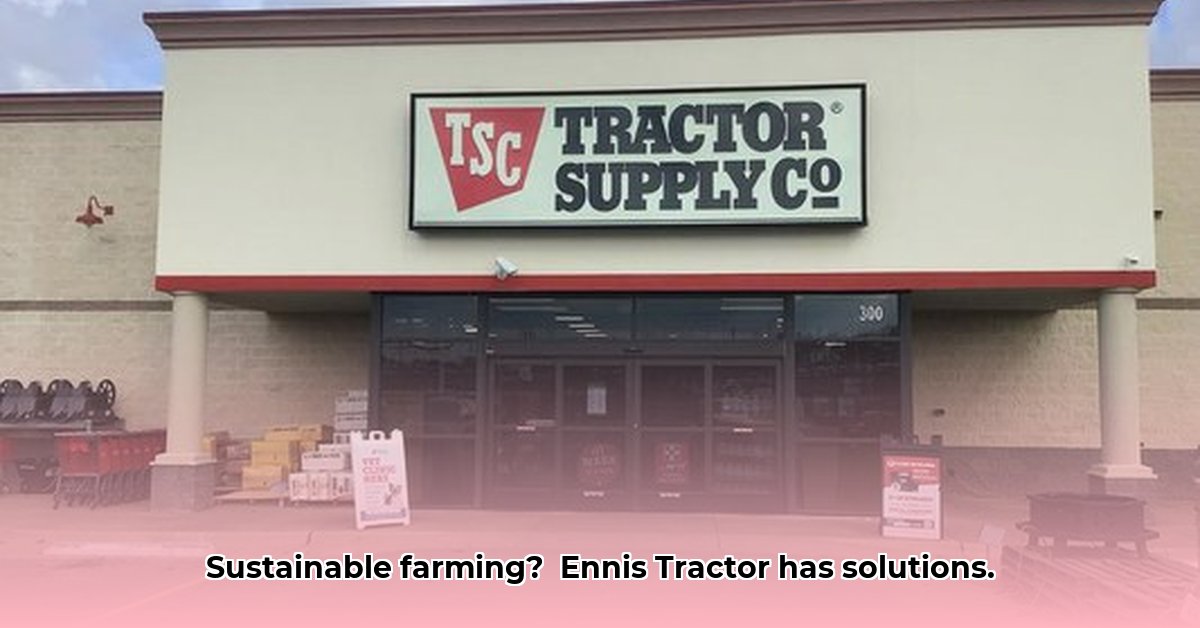
Choosing Sustainable Farming Supplies at Ennis Tractor Supply
Let's explore how Ennis, Texas' Tractor Supply Co. can support your sustainable farming goals. While offering numerous agricultural products, transparency regarding their sustainability remains a key area for improvement. This article provides actionable steps to help you make eco-friendly choices and encourage greater transparency from the retailer. For more information on sustainable grass seeds, check out this helpful resource.
How can Tractor Supply in Ennis better support sustainable farming? This question motivates many consumers. The increasing demand for organic and sustainably sourced products presents significant opportunities for retailers to act.
What Ennis Tractor Supply Offers
Ennis Tractor Supply provides a wide range of farming and gardening supplies, offering convenience by consolidating numerous needs into one location. This includes seeds, animal feed, tools, and fertilizers. However, a lack of comprehensive information about product sourcing, manufacturing processes, and environmental impact hinders informed consumer choices. This lack of transparency creates a significant challenge for those prioritizing sustainability.
The Need for Transparency in Supply Chains
The biggest hurdle is the absence of detailed information on product origins and production methods. This impacts our ability to make informed, sustainable choices. Consumers need clear information about:
- Sourcing: Where were raw materials sourced?
- Manufacturing: What processes were involved? Were sustainable practices employed?
- Transportation: What's the carbon footprint of product delivery to Ennis?
This isn't just about Ennis Tractor Supply—it's about the entire agricultural supply chain's responsibility in environmental protection. Consider the "organic" label on seeds: Knowing how those seeds were grown, including pesticide use and soil management, is crucial for making truly informed decisions.
Taking Action: Empowering Sustainable Choices
Consumers are not powerless. We can push for change.
1. Ask Questions: Engage with Tractor Supply staff. Inquire about product origins and manufacturing processes. Consistent questioning drives positive change.
2. Support Certified Sustainable Brands: Look for USDA Organic and other credible certifications (e.g., Fair Trade, carbon-neutral labels) guaranteeing sustainable practices. These certifications assure you that environmental concerns were prioritized throughout the product's lifecycle.
3. Advocate for Change: Contact Tractor Supply directly (email, letters, social media) expressing your desire for greater transparency regarding their supply chain. This collective voice demands increased accountability.
4. Become an Informed Consumer: Research sustainable farming practices to understand the questions to ask when selecting products. Numerous online and library resources are available. This knowledge empowers you to make better purchase decisions.
Collaborative Solutions for a Greener Future
Ennis Tractor Supply, local farmers, gardeners, and consumers all have roles in creating a more sustainable agricultural community. A collaborative effort is key.
| Stakeholder | Short-Term Actions | Long-Term Actions |
|---|---|---|
| Ennis Tractor Supply Staff | Provide thorough product information; participate in sustainability training. | Develop in-store educational materials on sustainable agriculture. |
| Local Farmers/Gardeners | Choose sustainable products; engage with suppliers to understand practices. | Share best practices within the community. |
| Ennis Tractor Supply Corporate | Conduct transparent supply chain audits; publicly share results. | Publicly commit to measurable sustainability goals with annual progress reports. |
| Consumers | Choose sustainably sourced products. | Advocate for transparency and sustainability from retailers and suppliers. |
Potential Risks and Mitigation Strategies
Ignoring sustainability carries risks.
| Risk Factor | Likelihood | Impact | Mitigation Strategy |
|---|---|---|---|
| Lack of Supply Chain Transparency | High | Significant negative impact | Implement third-party audits and publicize the results. |
| Insufficient Consumer Awareness | Medium | Moderate negative impact | Educate consumers through in-store promotions and online resources. |
| Competition from Sustainable Suppliers | Low | Minor negative impact | Expand product offerings to include more sustainable options. |
| Reputational Risk | High | Significant negative impact | Proactively engage with community groups and environmental organizations. |
Choosing Sustainable Supplies: A Step-by-Step Guide
- Check for Certification: Prioritize products with the USDA Organic seal. This ensures adherence to stringent standards.
- Read Labels Carefully: Scrutinize ingredients to avoid synthetic pesticides and fertilizers. Prefer natural alternatives.
- Minimize Packaging: Opt for products with minimal packaging to reduce waste.
- Source Locally: Whenever possible, support local suppliers to minimize your environmental footprint.
- Engage with Staff: Don't hesitate to ask Tractor Supply staff about their sustainable offerings.
Weighing the Pros and Cons
| Feature | Pros | Cons |
|---|---|---|
| Product Variety | Wide range of agricultural supplies. | Limited selection of certified organic products. |
| Convenience | Easily accessible in-store and online. | May lack detailed information on sourcing and sustainability practices. |
| Pricing | Varies widely; some sustainable options may cost more. | Higher prices may be a barrier for some consumers. |
| Customer Service | Varies by location. | Inconsistent staff knowledge regarding sustainable products. |
The future of farming in Ennis depends on collaborative efforts to prioritize sustainable practices. By demanding transparency and making conscious choices, we can collectively foster a healthier and more thriving agricultural community.